Breaking: Supreme Court Limits SEC’s Use of In-House Trials in Fraud Cases

Highlights
- The Supreme Court has restricted the SEC's use of in-house trials, ruling that defendants in fraud cases deserve a jury trial in federal court.
- This decision overturns the SEC's previous method of handling specific securities fraud cases through internal administrative procedures.
- The ruling could impact how other regulatory agencies operate, reflecting the Court's trend of limiting federal regulatory powers.
The Supreme Court has significantly limited the powers of the Securities and Exchange Commission (SEC) by ruling that defendants in fraud cases have a right to a jury trial in federal court. This ruling overturns the SEC’s long-standing practice of resolving some securities fraud complaints through in-house proceedings, declaring them unconstitutional.
SEC’s In-House Fraud Trials Ruled Unconstitutional
The Supreme Court’s decision disrupts the SEC‘s approach to handling civil fraud complaints. Previously, the agency conducted many of these proceedings in-house, where administrative law judges appointed by the SEC presided. However, the court’s recent decision mandates that these cases should instead be heard in federal courts, providing defendants with the constitutional right to a jury trial.
The change comes after the agency reported imposing over $5 billion in civil penalties in the 2023 government fiscal year. How much of this amount was secured through in-house proceedings remains to be seen. In anticipation of the Supreme Court‘s decision, the SEC had already scaled back the number of cases it initiated in administrative settings.
Also Read: Ripple CLO Spotlights SEC’s Setback In Proxy Advisory Firms Rule
Court Limits Powers of Federal Regulator
This ruling alters the SEC’s enforcement strategy and sets a precedent that may affect other regulatory bodies. The decision underscores a broader trend where the current Supreme Court, influenced by conservative and business interests, has sought to limit the scope of federal regulators. For instance, in a prior decision, the court curtailed the powers of environmental agencies to regulate water pollution.
Additionally, the case, initiated by Houston hedge fund manager George R. Jarkesy against stiff penalties imposed by the SEC, highlighted the disparity in case outcomes between federal courts and in-house proceedings. Jarkesy’s lawyers pointed out that the SEC had a higher success rate in administrative settings than federal courts, winning almost all cases in the former but only about 60% in the latter.
The 5th U.S. Circuit Court of Appeals previously supported Jarkesy’s position, stating that Congress had granted the SEC “unfettered authority” to decide the forum for trying cases, an unconstitutional power. Moreover, the court criticized laws that protect the SEC’s administrative judges from being dismissed by the president, suggesting such protections also violate constitutional norms.
Also Read: Bloomberg Analyst Predicts Solana ETF To Launch In 2025
Play 10,000+ Casino Games at BC Game with Ease
- Instant Deposits And Withdrawals
- Crypto Casino And Sports Betting
- Exclusive Bonuses And Rewards

- Crypto Market Bill Hits New Deadlock as Banks Reject White House Deal
- Why Experts Are Warning Bitcoin Rally Could Be A “Dead Cat Bounce”
- BTC and Gold Price Bounce as Trump Admin Brokers US-Venezuela 1000 Kg Gold Deal
- SEC Advances Major Crypto Securities Plan to White House for Approval
- Peter Brandt Flips Bullish, Predicts Bitcoin Rally As Price Holds Above $70k
- XRP Price As Bitcoin Reclaims $74K- Is $5 Next?
- Dogecoin Price Outlook as BTC Recovers Above $73,000
- XRP Price Prediction as Iran-U.S. Peace Talks Trigger a Crypto Rally
- COIN Stock Analysis as Bitcoin Retests $72k Ahead of February NFP Data
- Robinhood Stock Price Prediction As Cathie Wood Buys $12M Dip in Bold ARK Move
- Bitcoin Price At Risk? Professor Who Predicted US-Iran War Says America Could Lose

 Buy $GGs
Buy $GGs
















